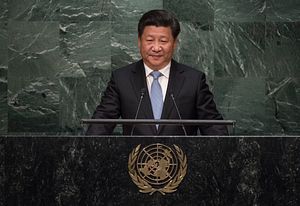At this month’s climate talks in Marrakesh, a senior Chinese negotiator stated that “all [countries] want to cooperate to combat climate change,” adding that “any movement by the new U.S. government” — a reference to President-elect Donald Trump — would not affect its own greening efforts.
It was an arresting juxtaposition: a country that had long been one of the principal hurdles to global efforts on climate change, urging the world’s preeminent power not to abandon the landmark COP21 accord that was inked in Paris last December. While Trump has walked back his campaign pledge to abandon that agreement — he told the New York Times that he has “an open mind” about it — China can now lay greater claim to the moral high ground.
There is, of course, more than meets the eye. Beyond having compelling domestic incentives to fight global warming — four decades of torrid industrialization have exacted an enormous toll on its air, soil, and water — China has strong commercial reasons to advocate for continued adherence to COP21: with the world’s largest installed capacities of wind and solar power, as well as its fastest-growing nuclear power program, China “plans to be the supplier of low-carbon goods to a carbon-constrained world.”
A similar logic — assuming leadership to pursue economic interests more actively — emerges in the arena of trade. China is already the world’s economic engine, projected to contribute nearly two-fifths of global growth this year. Now, with the Obama administration having given up on the Trans-Pacific Partnership (TPP), and with Britain’s impending departure from the European Union casting further doubt on the Transatlantic Trade and Investment Partnership’s prospects, China is seen, by default, as the leading champion of open trade.
A recent editorial in the China Daily observed that it is “understandably relieved that the exclusive, economically inefficient, politically antagonizing TPP is looking ever less likely to materialize by the day.” It advised Trump to “realize that the more open, inclusive Regional Comprehensive Economic Partnership will turn out to be a far more efficient vehicle for advancing U.S. interests.” At this month’s APEC Economic Leaders’ Summit, President Xi Jinping declared that China would “push to build an Asia-Pacific free-trade zone and an open world economy.”
Under the banner of promoting openness and countering protectionism, China can more freely pursue a strategy to increase its centrality within the world’s economic order: with its “One Belt, One Road” initiative, which aims to connect 65 countries and approximately 40 percent of gross world product through infrastructure projects, it envisions itself as the center of an integrated Eurasian economic area.
The debate over last July’s nuclear deal with Iran offers yet another example of China’s emerging thinking. The Joint Comprehensive Plan of Action (JCPOA) eliminates two-thirds of Iran’s centrifuges and 98 percent of its enriched-uranium stockpile; intelligence experts in the United States and Israel expect that it will freeze Iran’s nuclear program for at least a decade. If Trump withdraws U.S. support from the JCPOA or attempts to renegotiate it, Iran may decide to resume its nuclear program — an outcome that would significantly compound disorder in the Middle East.
China has always warned against nuclear proliferation in that region, given how dependent it is on a stable flow of energy from OPEC member countries. It is even more keen on preventing that outcome in light of the opportunities the JCPOA has afforded it to secure additional oil from Iran: the China National Petroleum Corporation has acquired a 30 percent stake in a $4.8 billion project to develop the 11th phase of the South Pars gas field; Sinopec and the Iran Oil Ministry, meanwhile, have finalized a $1.2 billion deal to renovate and boost production at Iran’s largest refinery.
Observers have long wondered whether China will seek to overturn the postwar order and, if it indeed harbors that ambition, what alternatives it might offer. The chair of the Foreign Affairs Committee of China’s National People’s Congress offered a candid answer at the beginning of this year: “We are dissatisfied and ready to criticize. Yet we are not ready to propose a new design… We need to come up with more specific ideas, to reassure others and advance our common interests.” The uncertainty that Trump’s election has injected into world affairs may temporarily ease pressure on China to propose such a concept. At least for the next few years, it is more likely to be called upon simply to help avert the existing order’s collapse — a daunting task, certainly, but not as ambitious as gaining traction for a successor design.
A few caveats are in order. Trump’s final positions on the Paris accord and the Iran deal remain to be seen, and America’s perch in the Asia-Pacific hinges on more than one trade deal; Alan Beattie reassures Americans that their country’s “role in Asia — and Chinese ambitions to replace it — will be determined by far more than just TPP.” Nor will growing questions about America’s role in the world exempt China from scrutiny; it will continue to be criticized — increasingly so, in all likelihood — for protecting North Korea, creating “facts on the ground” in the South China Sea, and using economic coercion to advance its national interests.
Still, in assuming leadership on causes such as fighting climate change, promoting open trade, and combating nuclear proliferation, it has an unexpected convergence of opportunities: on the one hand, to be more of the “responsible stakeholder” that the United States has long urged it to be; and, on the other hand, to advance its commercial interests more vigorously and intensify a long-term effort to construct a global economic architecture with Chinese characteristics.
Ali Wyne is a nonresident fellow with the Atlantic Council’s Brent Scowcroft Center on International Security and a security fellow with the Truman National Security Project.

































